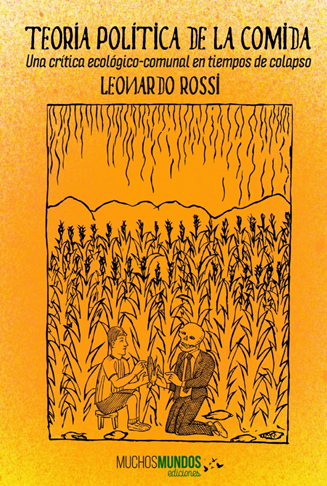A critical political theory of food that is emerging on the threshold of the Capitalocene
Keywords:
political ecology, global agri-food model, agri-food communalityAbstract
The book Political Theory of Food was written by Leonardo Rossi, using as a basis the results achieved within the framework of his doctoral thesis in Political Science. The author has a degree in Social Communication and a member of the Southern Political Ecology Research Collective (IRES-CONICET) of Catamarca in which he registers his research and activism activities.
The centrality of the work is to address the ontological-political implications of the link that is woven between human communities, territories and food based on epistemological debates derived from the field of Latin American political ecology. The critical theory outlined here constitutes a substantial epistemic-political commitment (Rossi, 2023) that emerges from the meticulous theoretical, historical and conceptual investigation that the author makes of the human agri-food plot. To do this, it tracks and breaks down those milestones in the planet's food geopolitics that led us to the threshold of the Capitalocene. Likewise, in a contrastive sense, Rossi proposes to unravel a cartography of hope by examining agroecological experiences that are woven in the provinces of Córdoba and Catamarca - territories surrounded by extractive devastation -, which aim to cultivate plots of agri-food communality. For the author, it is precisely these ontological designs, based on practices of political production of the common, that offer concrete clues to retrace the deep ecological-civilizational crisis that we are going through. As Machado Aráoz describes in the prologue, this work invites us not to passively contemplate the apocalyptic course of agribusiness, but rather “to know how to look/feel and learn to care for the agrocultural practices that subsist in the margins and the counterhegemonic soils that still cultivate communality and produce the food that nourishes the horizons of other possible futures.”ecology, global agri-food model, agri-food communality.
Downloads
References
Alimonda, Héctor (2018). En clave del sur: la Ecología Política Laatinoamericana y el pensamiento crítico. En Alimonda, H. et al. Ecología política latinoamericana: pensamiento crítico, diferencia latinoamericana y rearticulación epistémica. Volumen 1. Clacso, Buenos Aires.
Foster, John Bellamy (2004). La Ecología de Marx. Materialismo y Naturaleza. Madrid: El Viejo Topo.
Escobar, Arturo (2017). Autonomía y diseño: la realización de lo comunal. Buenos Aires, Tinta Limón.
Gutiérrez Aguilar Raquel, Navarro Trujillo Mina y Linsalata Lucía (2017). Repensar lo político, pensar lo común. Claves para la discusión (pp.377-417). En Modernidades Alternativas (Inclán, Linsalata y Millan coords.). México, UNAM / Del Lirio.
Machado Aráoz Horacio y Rossi Leonardo (2020). Repensar (la producción d-) el Pan, repensar (nuestra relación con) la Tierra. Clave para una renovación (y radicalización) del pensamiento crítico y las energías revolucionarias (pp.39-76). En Bajo el Volcán Revista. Puebla, año1, N°2 digital.
Machado Aráoz, Horacio. (2017) “América Latina” y la Ecología Política del Sur. Luchas de re-existencia, revolución epistémica y migración civilizatoria. En Alimonda, H. et al. Ecología política latinoamericana: pensamiento crítico y horizontes emancipatorios en clave sur. Volumen 2. Clacso, Buenos Aires.
Machado Aráoz, Horacio (2023) Recrear la comun-idad del pan: el desafío geológico político para una nueva Era. En Rossi, L. Teoría Política de la Comida. Una crítica ecológico-comunal en tiempos de colapso. Ed. Muchos Mundos. Bs. As
Rossi, Leonardo. (2023). Teoría Política de la Comida. Una crítica ecológico-comunal en tiempos de colapso. Ed. Muchos Mundos. Bs. As.
Sgarella, Soledad. (2023). Comer es comunalizar. La Tinta. Córdoba. 31 de agosto de 2023. https://latinta.com.ar/2023/08/31/comer-es-comunalizar/

Downloads
Published
Issue
Section
License

This work is licensed under a Creative Commons Attribution-NonCommercial-ShareAlike 4.0 International License.
Authors who have publications with this journal agree to the following terms:
a. Authors will retain their copyright and grant the journal the right of first publication of their work, which will simultaneously be subject to the Creative Commons Attribution License that allows third parties to share the work as long as its author and first publication in this journal are indicated.
b. Authors may adopt other non-exclusive license agreements for distribution of the published version of the work (e.g., deposit it in an institutional telematic archive or publish it in a monographic volume) as long as the initial publication in this journal is indicated.
c. Authors are allowed and encouraged to disseminate their work through the Internet (e.g., in institutional telematic archives or on their web page) after the publication process, which may produce interesting exchanges and increase citations of the published work (see The effect of open access).

